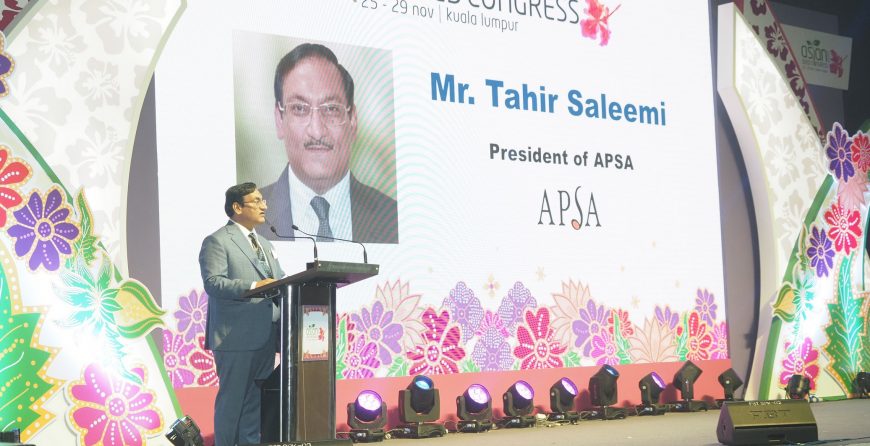6th December 2019
ASC’19 Proves to be a Success for All
The fully-packed five-day 26th Asian Seed Congress successfully came to an end on 29th November 2019 with a piece of celebratory cake distributed to each member country in the form of new alliances, groups, trade deals, and business decisions.
The program started with the inaugural ceremony where the theme of the congress was stressed upon by the President of Asia Pacific Seed Association (APSA) – Mr. Tahir Saleemi – to be Intellectual Property Rights (IPR) in this age of seed piracy which continues to threaten the livelihoods of farmers and breeders alike. This was followed by a series of technical sessions under Special Interest Groups (SIGs) and Standing Committees (SCs) represented by experienced experts and professionals from the fields of academia, science, literature, politics, research, etc.
Specializing in different varieties of seeds, SIGs prepared study tours for delegates to learn how technology is used in fields crops. Maize crops, vegetables and ornamentals like sunflowers were made the center of attention for the group keeping in mind how recent developments like climate change, international trade and technology have an effect on the seed industry. Standing committees (SCs) on the other hand were focused on dissecting the nature of these developments and recommending future courses of action following these.
Another highlight of the event was the different workshops conducted by the delegates themselves, representing different country-specific and region-specific concerns and issues. From the Global South, India dissected the issues of Plant Variety Protection (PVP) with regard to the lack of infrastructure resulting in a lack of implementation of the law and the attack of the pest called fall armyworm (Spodoptera frugiperda) inhibiting crop quality/quantity. At the same time, existing solutions to these native issues in the seed industry were challenged. For example, the tradition of using pesticides was brought in to question as being unsafe and ineffective.
From Pakistan, the Seed Association of Pakistan (SAP) presented the issue of the adverse effect of climate change on the most suffering crop of 2019, cotton. Such presentations can help give way to future discussions on the possibility of perhaps modifying the existing famous Bt Cotton hybrid to not only high yielding cotton but also which is hot climate- resistant.
1500 delegates gained an insightful world of concerns and innovations as new seed varieties and consequently, new trade deals were uncovered and agreed upon amongst them. This proved to be a fruitful opportunity for the Pakistani seed industry to discuss joint ventures with other businesses of the Asia-Pacific region for the production of seeds now that Pakistan is going through seed shortages of staple vegetables like tomatoes and onions. Being heavily dependent on seeds from India has landed Pakistan in trouble with a trade ban all together as a result of increasing political rifts between the two countries. This has translated into a price hike of vegetables in the country which is worsening given the depreciation of the Pakistani rupee. On the bright side, this turmoil has proven to be an impetus for national seed businesses to look for avenues to fill in the market space left behind by Indian businesses. This can be seen by the efforts of Pakistani businesses to bring in the solution of local seed production with the help of joint ventures using the stage provided by the congress this year. This, however, may not be able to become a reality without the support of the government of Pakistan. Without the allocation of resources to assist these ventures in carrying out research and development, one cannot hope to see a positive turn in the situation on the ground.
Alongside new business ventures on the table at ASC’19, a new alliance was formed between a group of 25 delegates representing the Lower Mekong Initiative (LMI) and the United States Department of Agriculture (USDA), the American Seed Trade Association (ASTA) and the governments of five Lower Mekong countries (Myanmar, Thailand, Laos, Vietnam, and Cambodia). By participating in the ASC’19 and engaging directly with stakeholders from all concerned sectors, the LMI representatives were able to gain valuable insights about the challenges and opportunities in seed sector development, which can be expected to apply to future dialogue, strategy, and policy at a regional level.
Also special to ASC’19 has been the creation of the APSA Young Members Club to attract young talent to have their innovative ideas invested in by providing relevant resources and to create awareness on the importance of global agriculture and seed industry.
With these developments, each member country was given a chance to be represented at the most prestigious annual event of the global seed industry and have their concerns voiced. With numerous trade deals and emerging problems discussed, a great precedent has been set forth for dialogue and implementation of strategies at the next Asian Seed Congress to be held in China from 9th to 13th November 2020.



 Head Office:
Head Office:  +92 42 36619881-2
+92 42 36619881-2
 +92 302 8665445-7
+92 302 8665445-7

 Mon-Sat - 9 AM until 5 PM
Mon-Sat - 9 AM until 5 PM
